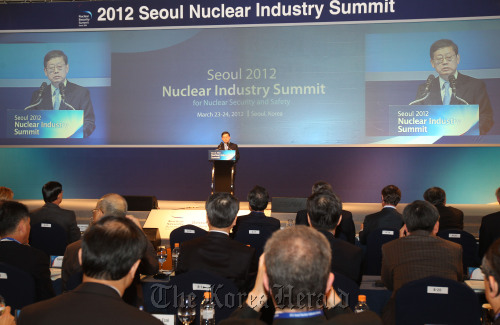Representatives of power companies, international organizations vow stronger cooperation for nuclear security, safety
More than 200 nuclear industry leaders from 36 countries agreed to enhance nuclear security and minimize the use of highly enriched uranium on Friday at the Seoul Nuclear Industry Summit.
The Seoul NIS, given the theme of “The Role of the Nuclear Industry in Enhancing Nuclear Security and Safety,” was held at the Grand Intercontinental Hotel as an auxiliary event of the Nuclear Security Summit on Monday.
Three working groups reported on the results of their activities and discussions on three topics ― minimization of civilian use of HEU, securing sensitive information and the nexus between security and safety post-Fukushima.
The NIS, representing 118 entities including power companies and international organizations, consolidated the working groups’ opinions and issued a joint statement on the activities the industry should perform to strengthen nuclear security.
Participating entities pledged to enhance security culture by continuing to raise awareness among employees of security threats and fostering an open environment for reporting security concerns, according to the joint statement.
They would also seek to further minimize the use of HEU through the conversion from HEU to low-enriched uranium fuel in research reactors, where technically and economically feasible, and to expand the use of LEU targets for radioisotope production, providing that a continuous and stable supply of Mo-99 to the nuclear medicine community will not be jeopardized.
 |
Prime Minister Kim Hwang-sik delivers congratulatory remarks at the Seoul Nuclear Industry Summit on Friday at the Grand InterContinental Hotel in southeastern Seoul. (Yonhap News) |
The entities vowed to strengthen security measures against increasing cyber threats, promote the exchange of nuclear security information and best practices concerning security of sensitive nuclear information, and assist newcomers in creating necessary infrastructure for safe and secure use of nuclear energy, according to the joint statement.
The nuclear industry had held conferences on nuclear security in 2010 in Washington and Buenos Aires after the first Nuclear Security Summit in Washington.
“All workers and companies in the nuclear industry are bound together by a common destiny when it comes to securing safety,” Kim Jong-shin, chief executive of Korea Hydro and Nuclear Power Co. and head of the NIS organizing committee, said during a press conference at the summit.
“We should share information 100 percent and make efforts to raise transparency to restore the public’s confidence in nuclear energy.”
Kim Joong-kyum, chief executive of Korea Electric Power Corp. and chairman of the Korea Atomic Industrial Forum, mentioned a forecast by the International Atomic Energy Agency that 300 more nuclear power plants will be constructed globally by 2030, making 750 units in total.
“In order to design, build and manage 300 more nuclear power plants by 2030, 100,000 additional professionals are needed by then, out of which 10 percent or 10,000 core professionals must be deployed worldwide,” Kim said, asking for attention and support to the KEPCO International Nuclear Graduate School which opened in March.
Prime Minister Kim Hwang-shik noted that although Korea has been expanding investment to develop renewable energy sources, it would be more realistic to focus on making efforts for safe use of nuclear energy for the next 40 to 50 years.
The prime minister called for industry-wide international cooperation to ensure nuclear security and safety, sharing of knowledge and information on nuclear power among governments, businesses and the general public, and urged the industry leaders to take on a greater role and responsibility in promoting nuclear security and safety.
During the morning session, co-chairs of the NIS International Advisory Committee such as John Ritch, director general of the World Nuclear Association; Roger Howsley, president of the World Institute for Nuclear Security; Laurent Stricker, chairman of the World Association of Nuclear Operators; and Marvin Fertel, president of the Nuclear Energy Institute, delivered keynote addresses on the industry’s role in enhancing nuclear security and expectations for the Seoul NIS.
A panel discussion session followed in the afternoon, during which Takuya Hattori, president of Japan Atomic Industrial Forum, Inc., gave a presentation on the current situation of the Fukushima nuclear plant that was crippled by a tsunami a year ago.
Sun Qin, president of China National Nuclear Corporation; Philip Beeley, professor at Khalifa University in the United Arab Emirates; and Chang Soon-heung, president of the Korean Nuclear Society, also gave presentations on regional cooperation for nuclear security and safety, 3S (safeguards, safety and security) infrastructure as a newcomer and nuclear security beyond 2012, respectively.
The prime minister hosted a dinner for around 120 participants later Friday.
Tour programs are scheduled for Saturday for NIS participants to visit nuclear facilities and historical attractions.
By Kim So-hyun (
sophie@heraldcorp.com)








